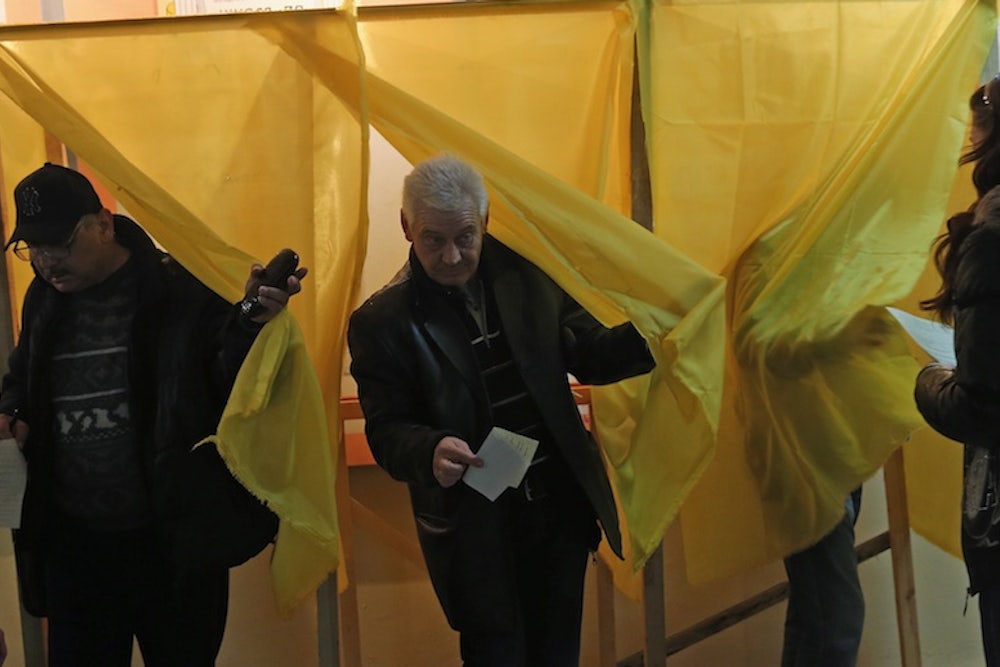Voting is underway in Crimea, where not one but two referendums held today will determine whether the peninsula will become Russian territory. Here's a quick primer on today's vote to clarify some of its important details:
What do you mean there are two referendums?
The first referendum is Crimea-wide, and all citizens of the Autonomous Crimean Republic can participate. A second, smaller referendum is being held in the city of Sevastopol, which is governed separately from the rest of Crimea even though it's one of the largest cities on the peninsula. Pro-Russian organizations in the Ukrainian city of Kharkov have also said they will hold their own referendum today.
Residents of Crimea are in the rather strange position of having to vote on whether to join Russia while its forces have all but taken over the peninsula—that's why some have discounted the referendum as an exercise in voting with a gun to your head. Mother Russia, meanwhile, is doing as much as it can to promote the referendum, which lends the veneer of democracy to its invasion. The official website of the referendum is referendum2014.ru—note the Russian domain, which was set up after the original site referendum2014.org.ua, shut down after repeated denial-of-service attacks.
What are they voting on?
Here's what the ballot looks like:

You'll notice that there are two questions on the ballot, each divided into three parts. The first question asks: “Are you in favour of unifying Crimea with Russia as a part of the Russian Federation?” The second asks, “Are you in favour of restoring the 1992 constitution and the status of Crimea as a part of Ukraine?” Voting for the status quo is not an option, and as EuroNews points out, "The second question is somewhat contradictory because the 1992 constitution, adopted after the collapse of theUSSR and quickly abandoned, provided for Crimea as an independent state."
A mock-up of #Crimea referendum ballot handed out in Simferopol. Oh look, they've saved you some work! pic.twitter.com/82PAFcR6kB
— Dan Peleschuk (@dpeleschuk) March 14, 2014The ballot will be available in the three most popular languages spoken in Crimea: Russian, Ukrainian, and Crimean Tatar. Results will be tallied overnight, and the referendum will pass.
Who is eligible to vote?
Citizens of the Autonomous Republic of Crimea and the City of Sevastopol. But that rule does not seem to be being enforced. Earlier today, Russian journalist Ekaterina Sergatskova was told she could cast a vote. Sergatsova holds a temporary residence permit in order to report on the referendum, but is a citizen of the Russian Federation. "Well, of course you can [vote], because you live here," she says election staff told her. Members of the Ukrainian military may also participate, though they are not being discharged from their stations to do so, RT made a point of reporting early Sunday. The referendum needs a 50 percent turnout in order to be considered legitimate, Crimean authorities have said. As of Sunday afternoon, turnout was 45 to 50 percent across 1,169 polling stations, observers told Izvestia. Crimea has said the final turnout will stand at around 80 percent.
Are any election observers present?
Yes. But they're a very select group of about 30 international observers authorized by the Crimean government, who were paraded to the press at a news conference yesterday. "Speaking near-flawless Russian and repeating Russian talking points on the Ukrainian crisis word for word, a motley team of foreign election observers lined up to praise the referendum at a press conference Saturday evening," Buzzfeed's Max Seddon reported from the scene. The OSCE tried to get a team of 40 observers into Crimea, but warning shots were fired when the group tried to pass through a checkpoint last week. Crimea has since "invited" OSCE observers to attend the referendum.
This is a Crimean electoral observer badge. Note the stamp. pic.twitter.com/onxrRwAvhd
— max seddon (@maxseddon) March 15, 2014Press conference of the "international observers" for tomorrow's referendum... pic.twitter.com/MmihNvdvin
— Shaun Walker (@shaunwalker7) March 15, 2014 Is the referendum legal?
Not according to the Ukrainian constitution, which stipulates that the entire population of Ukraine has to vote on any change of territory. The Crimean government is constitutionally bound to obey the Ukrainian parliament, and does not have the self-determination necessary to declare independence. The US and EU have both said the vote will be illegitimate, and Russia maintains otherwise. Yesterday, Russia vetoed a UN resolution criticizing the referendum, BBC reports.
What will happen next?
Crimea will become part of Russia, and Putin will probably invade eastern Ukraine. Julia Ioffe explains why.
